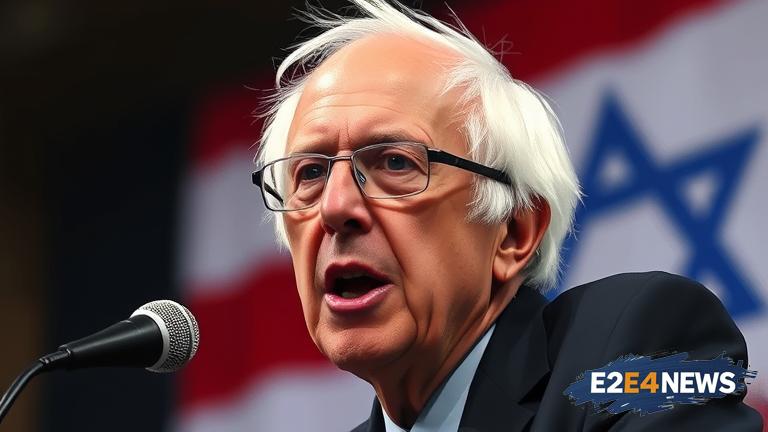US presidential candidate Bernie Sanders has been at the center of a heated debate after referring to the Israeli government as ‘racist’ during a live blog update. The comments were made in response to the Israeli government’s treatment of Palestinians, with Sanders expressing his concerns over the ongoing conflict in the region. The Israeli government has been accused of human rights abuses and discriminatory policies towards Palestinians, with many critics arguing that these actions are rooted in racism. Sanders’ comments have been met with both support and criticism, with some praising his willingness to speak out against injustice and others condemning his use of the term ‘racist’. The Israeli government has denied allegations of racism, arguing that its actions are necessary for national security and self-defense. However, many experts and human rights organizations have disputed this claim, pointing to evidence of systemic discrimination and oppression. The conflict between Israel and Palestine has been ongoing for decades, with both sides suffering significant losses and hardships. The international community has been calling for a peaceful resolution to the conflict, with many leaders advocating for a two-state solution. Despite these efforts, the situation remains volatile, with periodic outbreaks of violence and tensions running high. Sanders’ comments have highlighted the need for a more nuanced and informed discussion about the Israeli-Palestinian conflict, with many arguing that the US has a critical role to play in promoting peace and justice in the region. The US has historically been a strong ally of Israel, providing significant financial and military support. However, in recent years, there has been growing criticism of US policy in the region, with many arguing that it has been too one-sided and has failed to adequately address the needs and concerns of Palestinians. Sanders’ comments have sparked a wider debate about the role of the US in the Israeli-Palestinian conflict, with many calling for a more balanced and equitable approach. The presidential candidate has been a long-time critic of Israeli government policies, and has consistently spoken out in support of Palestinian rights. His comments have been welcomed by many Palestinian activists and advocates, who see them as a significant step forward in the struggle for justice and equality. However, others have criticized Sanders for his use of language, arguing that it is inflammatory and unhelpful. The Israeli government has responded to Sanders’ comments by accusing him of being ‘misinformed’ and ‘ignorant’ of the complexities of the conflict. Despite these criticisms, Sanders remains committed to his position, arguing that the US has a moral obligation to speak out against injustice and promote human rights. The controversy surrounding Sanders’ comments has highlighted the deep divisions and complexities of the Israeli-Palestinian conflict, with many arguing that a peaceful resolution will require a fundamental shift in the way that the US and other international actors engage with the issue. As the debate continues to unfold, it remains to be seen how Sanders’ comments will impact the wider discussion about the Israeli-Palestinian conflict and the role of the US in promoting peace and justice in the region. The situation is likely to remain volatile, with ongoing tensions and periodic outbreaks of violence. However, many are hopeful that Sanders’ comments will help to galvanize a more nuanced and informed discussion about the conflict, and will ultimately contribute to a more just and equitable resolution. The international community has a critical role to play in promoting peace and justice in the region, and it remains to be seen how leaders will respond to the ongoing crisis. One thing is certain, however: the Israeli-Palestinian conflict will continue to be a major issue in international politics, and will require sustained attention and effort to resolve. The US presidential election is likely to be a critical moment in the debate, with many candidates facing questions about their position on the conflict. Sanders’ comments have set the tone for a more nuanced and informed discussion, and it remains to be seen how other candidates will respond. The conflict is complex and multifaceted, with deep historical and cultural roots. However, by engaging with the issue in a more thoughtful and informed way, it is possible to build a more just and equitable future for all parties involved. This will require a fundamental shift in the way that the US and other international actors engage with the issue, as well as a commitment to promoting human rights and justice. The road ahead will be long and difficult, but by working together, it is possible to build a more peaceful and prosperous future for the region.
